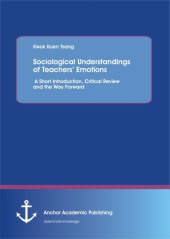 Neuerscheinungen 2014Stand: 2020-02-01 |
Schnellsuche
ISBN/Stichwort/Autor
|
Herderstraße 10
10625 Berlin
Tel.: 030 315 714 16
Fax 030 315 714 14
info@buchspektrum.de |

Kwok Kuen Tsang
Sociological Understandings of Teachers Emotions: A Short Introdution, Critical Review, and the Way Forward
Erweiterte Ausgabe. 2014. 148 S. 220 mm
Verlag/Jahr: ANCHOR ACADEMIC PUBLISHING 2014
ISBN: 3-9548932-2-3 (3954893223)
Neue ISBN: 978-3-9548932-2-5 (9783954893225)
Preis und Lieferzeit: Bitte klicken
Teachers emotions have been issues drawing the attentions of educational scientists. Since teachers emotions has been regarded as a psychologial phenomonon, the educational scientists explain how teachers feel and how their feelings affect educational process with psychological theories. However, more and more educational scientists note that teachers emotions are socially constructed and the social construction of teachers emotions is not explained by the psychological theories. As a result, they swith their theoretical perspectives from psychology to sociology. In the literature, the sociological theories they have employed include the labor process theory, theory of bureaucracy, emotional labor theory, post-structuralism, theory of emotinoal geographies, and identity theory. Nevertheless, each of the theories has some limitations. Therefore, the goals of this book is to (1) introduce and review the sociological theories which are applied to explain teachers emotions critically and (2) propose a sociological framework and research agenda for further studies based on the critically review.
Text Sample:
Chapter 1:
Teaching has been regarded as a very stressful and exhausting profession in the world (Corcoran & Tormey, 2012; Gavish & Friedman, 2010). It is particularly true in the twenty-first century, because all over the world many education reforms, which restructure education systems with a market logic and managerial approach, intensify teachers responsibilities and in turn make teachers suffer from work overload and the lack of leisure time (Valli & Buese, 2007). Consequently, teaching seems to become a less enjoyable occupation.More and more teachers all over the world have been identified as feeling stressed, exhausted, depressed, frustrated, dissatisfied, unhappy, demoralized, and alienated (Brooks, Hughes, & Brooks, 2008; Bullough, 2011; Cheng, 2009; Hargreaves, 2003; Hu lsheger, Lang, & Maier, 2010; Iltaf & Gulzar, 2013; Jeffrey & Woods, 1996; Kelchtermans, 1996, 2011; Lee & Yin, 2011; Leithwood & Beatty, 2008; Little, 1996; Mahony, Menter, & Hextall, 2004; Marshall & Ball, 1999; Morgan, Ludlow, Kitching, O´Leary, & Clarke, 2010; Santoro, 2011; Saunders, 2013; Trentini, 2012).The consequences of the negative emotions of teachers are twofold. First, negative emotions directly affect teachers psychological well-beings (Day &Qing, 2009). Research has demonstrated that a chronic experience of negative emotions such as stress, anxiety, depression, and exhaustion are positively correlated to mental and psychological disorders (Lau, Chan, Yuen, Myers, & Lee, 2008; Tang, Au, Schwarzer, & Schmitz, 2001; Yeung & Liu, 2007). In an extreme case, the negative emotions contribute to teachers suicide or self-harm (Leung, 1994). As witnessed between 2005 and 2010, for instance, there were at least eleven teachers who committed suicide because of intense feelings of job stress, exhaustion, and burnout in Hong Kong (Ng, 2010). Second, teachers negative emotions affect the quality and effectiveness of teaching (Sutton, 2005). Research has showed that teachers positive emotions like satisfaction and enjoyment are positively related to teachers motivation, self-efficacy, innovation, and commitment in teaching, while negative teachers emotions are negatively related to these sources of teacher effectiveness (Choi & Tang, 2011; Sutton, 2005; Sutton & Wheatley, 2003). Thus, Hargreaves said, good teaching is charged with positive emotion (1998b, p. 835) which is absolutely central to maintaining and improving educational quality in our schools (1998a, p. 315). Therefore, there is a growing body of literature which investigates the patterns of teachers emotions in order to find ways to improve teachers psychological well-beings and the quality of teaching (Corcoran & Tormey, 2012; Day & Lee, 2011; Day & Leitch, 2001; Hargreaves, 1998a, 2003; Kelchtermans, 2005; Nias, 1996; Saunders, 2013; Schutz & Zembylas, 2009; Tsang, 2014b; Zembylas, 2005c)


